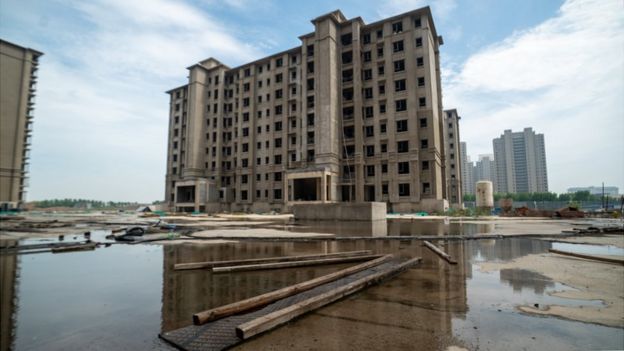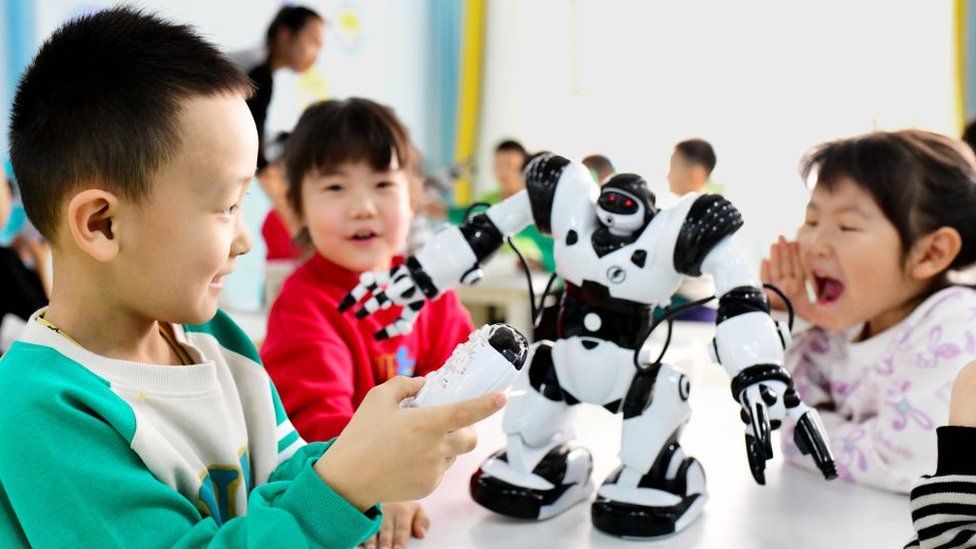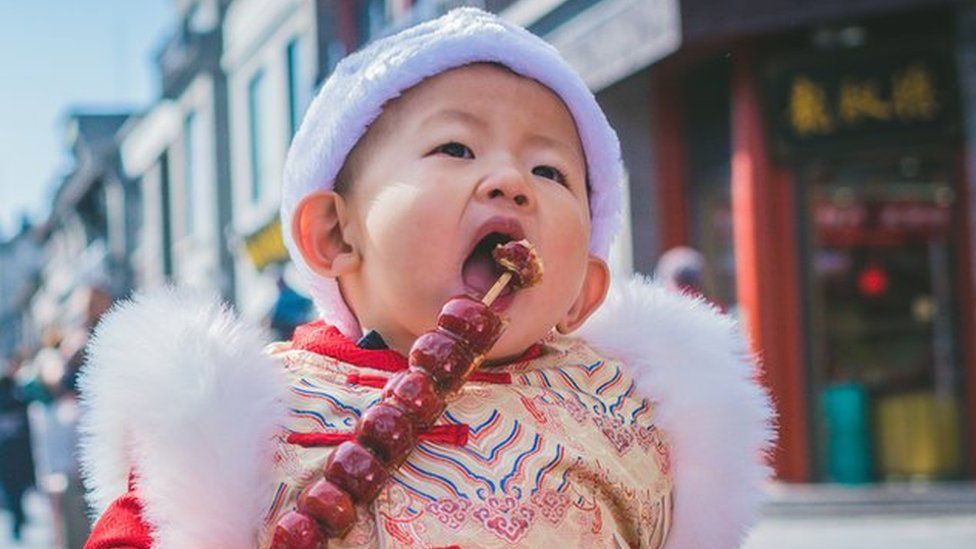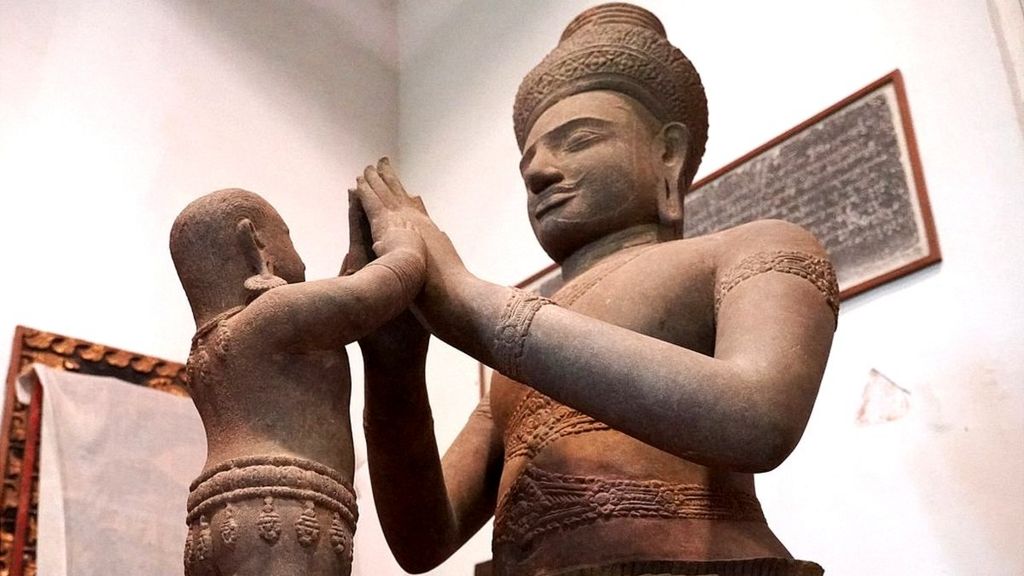Commentary: âAn awkward photo-opâ – Japanâs persistent gender problem
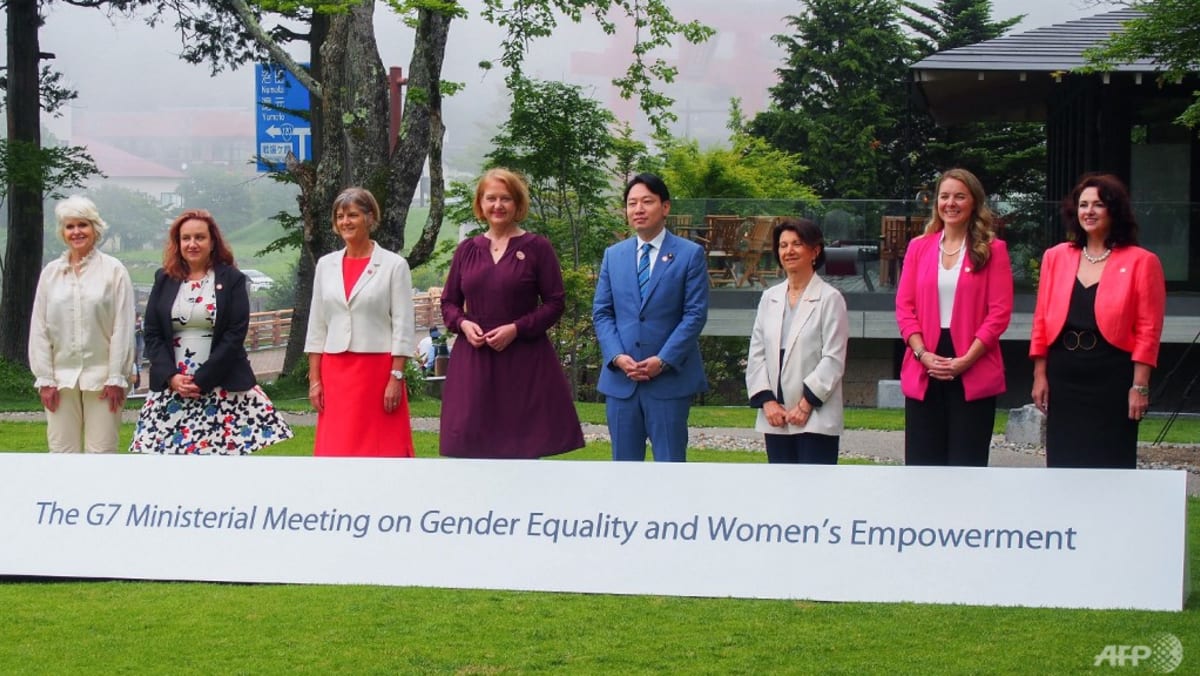
For an economy that struggles with labour shortages, women have long been an underutilised resource. Having achieved almost full parity in education attainment, Japan has one of the highest literacy rates globally, and 46 per cent of graduates from tertiary education are female.
However, at the elite University of Tokyo, only around 20 per cent of undergraduates are women. In addition, several universities have been found to discriminate against female students. In 2018, Tokyo Medical University admitted to manipulating the test scores of female applicants for more than a decade to ensure more male doctors. The scandal led to other universities admitting to similar discriminatory practices.
Despite a large percentage of female graduates joining the workforce at junior levels, the female employment rate has tended to drop for women in their 30s as they take temporary or permanent career breaks to focus on childrearing.
FORMER PRIME MINISTER SHINZO ABE’S “WOMENOMICS”
Recognising that Japan’s competitiveness and productivity depend on women’s increased participation, gender was one of the issues that former prime minister Shinzo Abe sought to tackle during his long tenure.
In September 2013, addressing the United Nations General Assembly, Abe stated his intention to create “a society in which women shine”.
A key part of his signature “Abenomics” strategy, which was launched in the same year, was “womenomics”, aimed at boosting female employment rates to the level of other developed economies, and promoting women into management roles. He also pledged to invest more heavily in education and childcare.
Nevertheless, after a decade of “womenomics”, the results are not “shining”.
Police crack down on illegal land sale to Chinese

CHIANG MAI: Police are pursuing legal action against 13 entities, including four Chinese nationals and six Thais, for operating a housing estate in violation of the law in Chiang Mai, deputy national police chief Pol Gen Surachate Hakparn said.
He said that the move came after Chiang Mai police and immigration officers inspected a housing estate covering more than 22 rai in Hang Dong district.
They found that the land is owned by two companies which list Thai citizens as their executives, even though they have no authority to run the business, Pol Gen Surachate said, adding the companies were allegedly used to hold shares on behalf of the real Chinese owners.
“The companies were set up for the purpose of holding land [on behalf of the Chinese suspects],” he said.
“The companies, which are run by Chinese nationals, would then sell long-term leaseholds to Chinese citizens.”
He said that Chiang Mai police and immigration officers had gathered evidence and filed a complaint with Hang Dong police to take legal action against 13 entities, which comprise three companies, four Chinese nationals — one of whom is on the run — and six Thai citizens.
Pol Gen Surachate also said that authorities had previously investigated another housing estate in San Kamphaeng district, which is operated by a company that authorities suspect was acting as a nominee for Chinese nationals.
Prosecutors indicted eight suspects in the case. The case is now being tried by the Chiang Mai Provincial Court, he said, adding that authorities will examine the money trail from the land sales in both cases and reclaim plots which have been illegally transferred to foreigners.
“The two housing estates have Thai nominees operating on behalf of foreigners,” Pol Gen Surachate said, adding assets acquired through money laundering will be seized.
Decision to deport Myanmar children condemned

Academics and NGOs have denounced a decision by Thai officials to deport 126 ethnic minority children at Thairath Wittaya 6 School in Ang Thong to their home country Myanmar.
In early June, local complaints were filed to authorities that a large group of ethnic children had enrolled in Thairath Wittaya 6 School, which had only two teachers, one director and one administrative staff member. Many children told an interpreter they were taken from an Akha village on Doi Mae Salong in Chiang Rai province, a hill separating Thailand and Myanmar.
However, all 126 ethnic minority children at Thairath Wittaya 6 School in Ang Thong were sent back to Chiang Rai on Wednesday, where their parents must pick them up and return them to Myanmar. Ang Thong Immigration Police, Ang Thong Social Development and Human Security Provincial Office and other related agencies organised their return.
A source from the Social Development and Human Security Provincial Office in Ang Thong said 30 children had already been sent back to their homes after their parents showed up to pick them up. The remaining children are at the Social Development and Human Security Provincial Office in Chiang Rai, waiting to be returned to Myanmar.
Asst Prof Darunee Paisanpanichkul, deputy dean of the Faculty of Law at Chiang Mai University, told the Bangkok Post that deporting the ethnic minority children is inappropriate and unnecessary since it is lawful for children of migrant workers to receive an education in Thailand despite their statelessness.
She said that the Department Of Provincial Administration should issue ID numbers for stateless children and register them into the education system. According to the Convention on the Rights of the Child, all children in Thailand are eligible to receive an education despite their ethnicity.
Weera Yooram, director of The Mirror Foundation and Raisom Learning Centre for Ethnic and Immigrant Children, said many ethnic minority children from Myanmar are sent to Thailand under their relatives’ care to receive an education.
Mr Weera said the deportation of the children was cruel.
“If [Thai officials] want them to study in Chiang Rai, they should contact local schools for student admission. [Deportation] will only make them give up education,” he said.
Wasan Paileeklee, the National Human Rights Commission commissioner, said that complaints had been lodged to the NHRC in June, asking authorities to protect the ethnic minority children’s rights to an education.
He said that NHRC had contacted local administrations in Chiang Rai to guarantee the children’s safety and opportunity to attend school.
Last week, police pressed charges of bringing and providing shelter to aliens on Thairath Wittaya 6 School’s principal, a class teacher, a janitor, and two Pa Mok village chiefs. All of them denied the accusations and will fight the charge.
China must rethink its reliance on property sales to see real growth
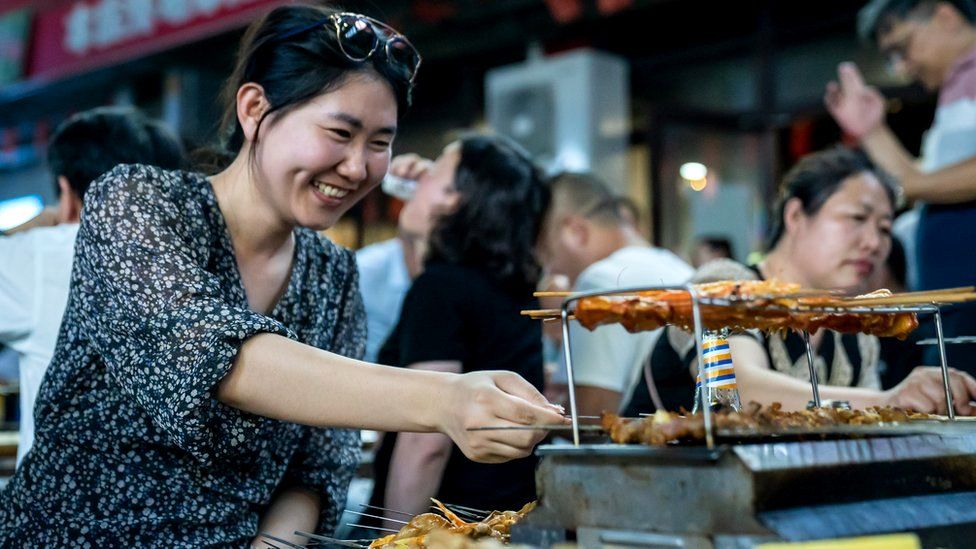 Joyce Liu/BBC
Joyce Liu/BBC The small eastern city of Zibo in Shandong province is experiencing an outdoor barbecue craze.
People from all over China are coming here to taste its lamb skewers, which have become legendary via social media.
It’s quite a raucous experience and certainly not for the faint-hearted.
The street is packed, you sit on little plastic chairs, drink beer and wrap chunks of meat with spring onion on the local flatbread while karaoke songs pump out in all directions.
On the face of it, these crowds appear to show an economy rebounding strongly from the coronavirus emergency – but according to economists that’s not the case.
Rather, they say, this is an example of people choosing a cheap, tasty, option at a time of great pressure on household incomes.
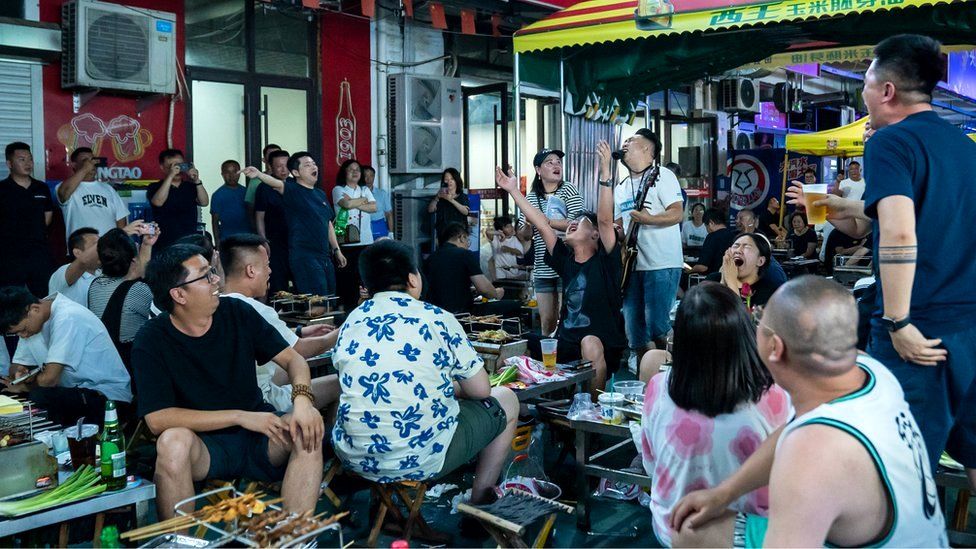
A man sitting with his shirt off tells us this is the perfect spot to enjoy a hot summer night with his family, and that this type of fun has a price tag to match the moment.
“This place is great for ordinary people,” he says. “Recently, it’s been hard to make money but still easy to spend it. After three years of Covid, the economy is only slowly recovering.”
University graduates are being hit especially hard by China’s economic doldrums, with youth unemployment hovering at or above 20%.
Some students are feeling nervous about their futures.
“Yes, I’m worried,” says one woman who’ll soon graduate. “There’s a lot of competition. It’s hard to find a job. All my classmates feel the same pressure.”
For those who have jobs, a big reason for their reluctance to spend big is economic security.
They’re concerned about the potential to join the ranks of the unemployed, and their household’s largest single investment is, in many cases, no longer worth what they thought it would be.
The real estate sector is under great stress in China.
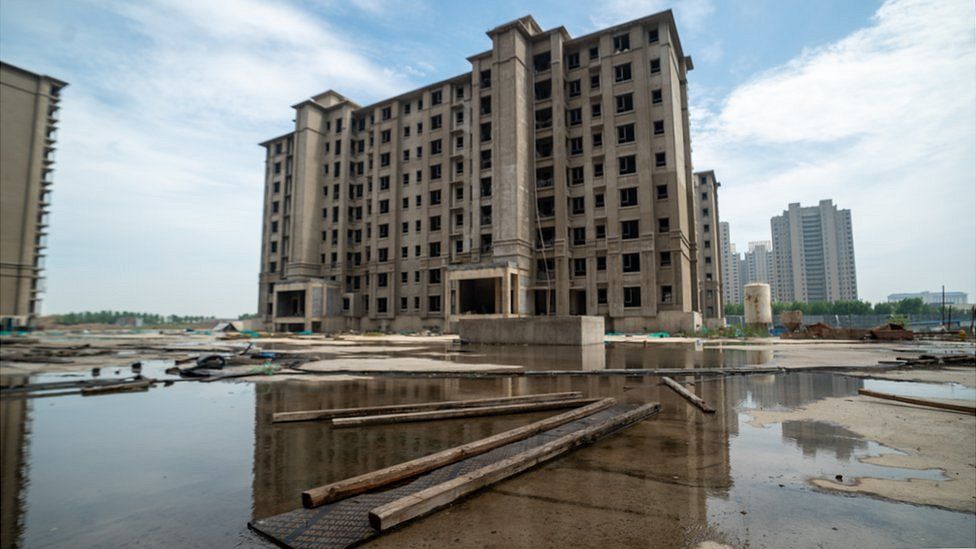
To see this first-hand, we drive a few hours east of Zibo to the outskirts of a much larger city, Qingdao.
Here, a property explosion hasn’t matched real demand from buyers or renters, and the result has been huge housing estates built with very few residents in them.
A woman is selling cold noodles from a portable stand outside her housing complex where she has few neighbours.
A few years ago, her husband bought a flat here after moving to Qingdao to give their child a better start because they heard the schools would be good.
I ask her if she’s worried about the value of her home collapsing.
“Of course I’m worried,” she says. “But what can I do?”
Nearby a couple who are street cleaners have stopped for lunch. They point to the huge estate behind them and say that nobody lives there.
Across the road there is a small forest of concrete towers without paint, without windows and with window frames now looking the worse for wear, having been exposed to the elements.
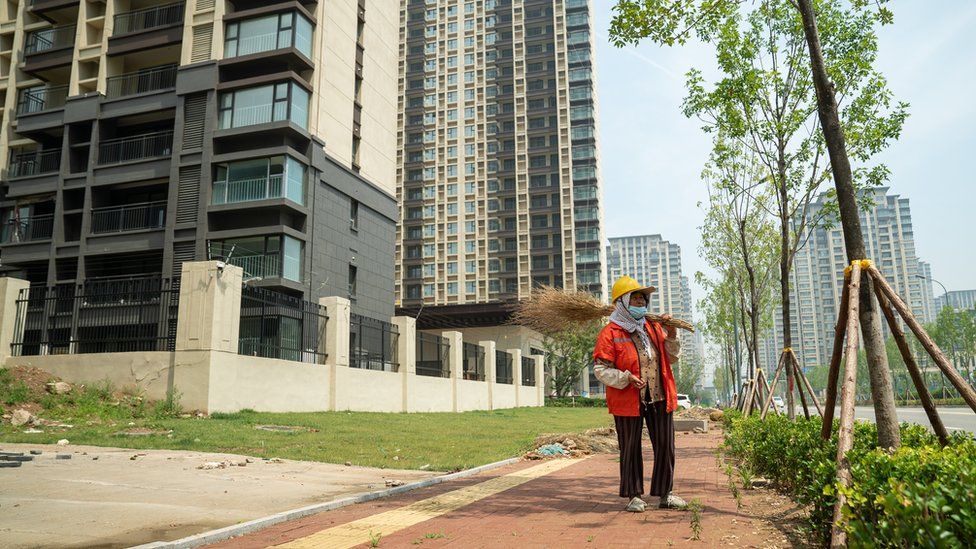
“Construction just stopped there one day last year,” the man says.
According to his wife, the entire suburb is pretty dead. “There’s nothing here. There’s no petrol station. You have to go a long way for fuel. It’s really not convenient to live here,” she says.
There had been hope that this region would take off after it hosted a major political meeting, the Shanghai Co-operation Organisation Summit, and China’s leader Xi Jinping gave it his personal stamp of approval as a place to invest and do business, potentially hosting international expos and the like.
But the factories, start-ups and other companies that would supposedly employ those who bought property here have been few.
According to a local real estate agent, sales volumes have halved in the area in recent years.
“Prices are down because the market is saturated,” she says. “Too many homes were built and it’s hard to sell them.”
We put up a drone to get a bird’s eye view and it looks even worse than at ground level.
Entire new housing estates where work has stopped can be found in all directions. Those that are finished don’t have much sign of life in them.
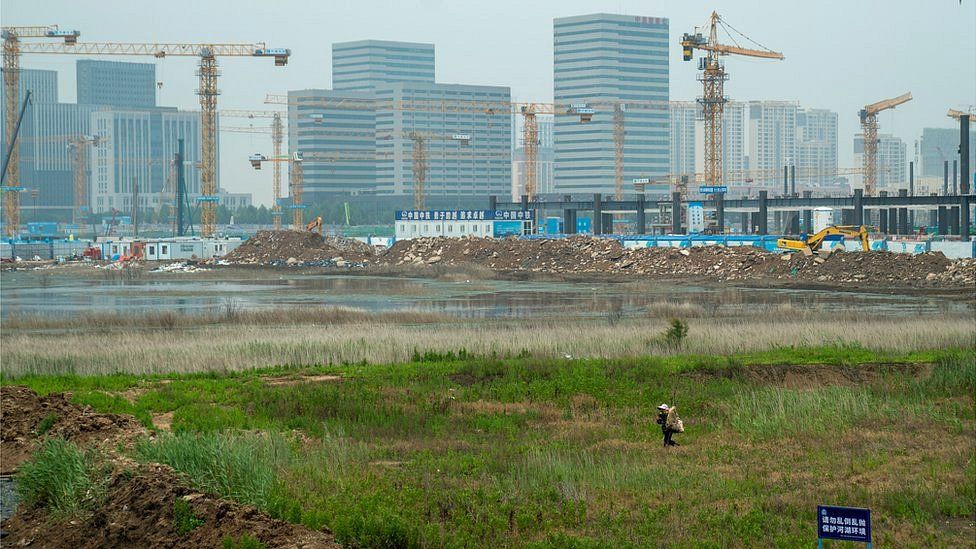
What’s more, this supply and demand problem isn’t unique to this area. It isn’t even unique to this city. In province after province across China, evidence pointing to the danger of a property bubble is easy to find.
One reason for rampant real estate speculation in this country has been a lack of other options for investment. But the boom in real estate drove house prices out of the reach of ordinary families in many big cities. The government response was to cap the number of flats any person could buy.
It was a genuine attempt at an egalitarian reform, but pressure is now coming to reverse this. In Qingdao, such measures have already been eased, in an attempt to stimulate its stalled real estate market.
The challenge for Chinese policymakers is to find a way to wean this economy off such a heavy reliance on property sales to generate growth and business confidence.
Economists like Harry Murphy Cruise, from Moody’s Analytics, think China is facing significant problems.
“China’s economy is in desperate need of rebalancing,” he tells the BBC from Australia. “It’s had that massive period of growth over the last two or three decades from big infrastructure building, from a massive uptick in the property market that is actually not a sustainable growth driver going forward.
“Look around the world, developed economies need households as a key driver of economic growth, and that is just not what China has at the moment.”
The Chinese government is considering ways to promote more spending by individuals and by businesses from interest rate cuts to cash handouts.
But the problem is sentiment.
People will feel more secure when there are more jobs. Businesses need to invest to create more jobs, but they are reluctant to do so while customers are so insecure.
As Harry Murphy Cruise puts it: “It’s sort of like the chicken and the egg. You can’t have that uptick in the economy unless you have business spending. They’re not spending until they see that uptick. So, there’s a stalemate that’s really holding back a key portion of the economy.”
Then there’s the chance that all of this will bleed into global trade.
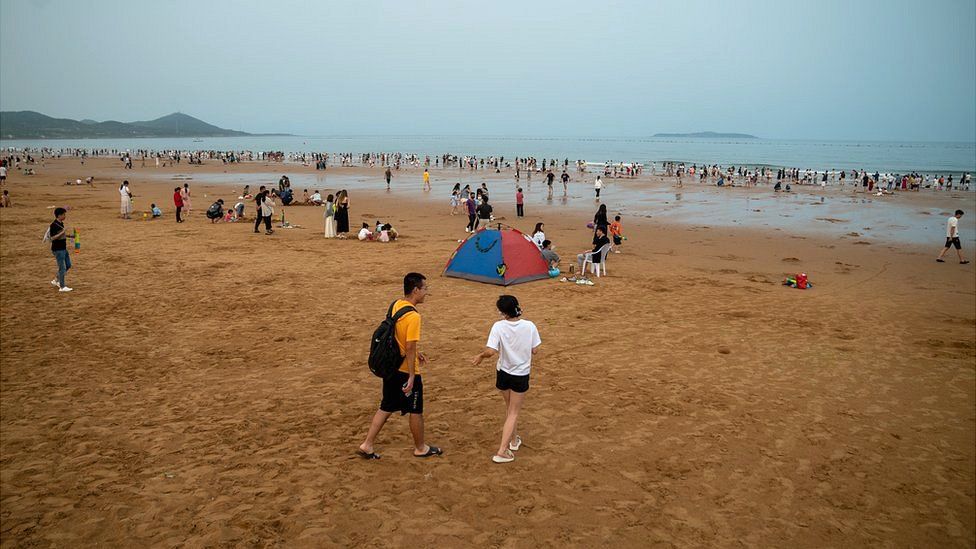
China is big. What happens to the world’s second largest economy turns ripples into waves.
Reduced manufacturing here – off the back of weak international demand – has resulted in fewer exports, fewer Chinese-made goods available worldwide and less business activity in Asia’s mega factory. Then the subsequent slower consumption in China means fewer imports of other countries’ products.
The headache for the Chinese government is that it may have to choose whether to go for a short-term stimulus fix, which would delay the rebalancing it will eventually need to face, or whether to absorb more immediate pain and bring on the long-term solution more quickly.
Naturally, there are almost certainly those in Beijing’s upper echelons of power considering some sort of middle path, starting with a milder boost to stabilise the economy, then considering the larger problems at hand.
Because they know that, once negative sentiment sets in, it can be hard to turn around.
Yet if you want to feel optimistic about Qingdao, and about life, you go to the beach. Tourism along its famous coastline does seem to be picking up.
There’s laughter, sandcastle construction and everyone – whether they’re a captain of industry or a truck driver – is enjoying the great embrace of the ocean.
Whether it matches reality or not, here you almost can’t help but feel that, despite everything, the future still has good things in store.
Related Topics
Runners abandon 1.29m speed pills on riverbank

NAKHON PHANOM: Authorities seized 1.29 million speed pills abandoned by fleeing smugglers on the bank of the Mekong River in the province’s That Phanom district.
Soldiers, police and local officials found three sacks containing the pills bearing the WY logo by the river in Khab Phuang, a village in tambon Nam in the early hours of Wednesday.
The smugglers on board a longtailed boat managed to flee, senior military officers said at a media briefing later that day.
The Office of the Narcotics Control Board and security officers said that speed pills seized along the border recently had been mixed with pesticides to reduce costs.
The drugs were being sold cheaply at 20-25 baht each to attract users, mostly workers and young people.
Increasing quantities of speed pills are being smuggled from Laos into northeastern Thailand. This has prompted security agencies to increase patrols both on land and water to stop the influx.
Over the past week, more than 10 million speed pills have been seized in That Phanom, officers said.
Cops nab 17 in raid over illegal site

Police have arrested 17 Vietnamese citizens for their alleged involvement in an online gambling site and a passport counterfeiting gang.
Yesterday, Bang Phli Police and Immigration Bureau officers raided three houses in Bang Phli district of Samut Prakan, which were being used as a base for the alleged crime ring.
The police said they confiscated 12 computers and equipment used in the production of fake passports, immigration stamps of Suvarnabhumi, Myanmar and Cambodia airports and contraband cigarettes at the house.
All 17 suspects were taken to Bang Phli Police Station for questioning.
Twelve were charged with luring people to participate in gambling, four with possessing official rubber stamps without permission, and one with possessing untaxed cigarettes.
According to their investigation, the Vietnamese suspects operate an online gambling website that is run by their Chinese employers.
The Chinese ringleaders would assign work to the Vietnamese suspects via Facebook accounts registered with a fake identity.
Once the assignments were distributed, the accounts would be closed to evade the authorities.
The three houses had been used as a base by the Vietnamese suspects for about a month.
They had relocated to Samut Prakan from a neighbouring province.
Before the raid, police found a group of illegal migrants whose passports were stamped with illegally-acquired immigration seals.
This led them to the houses in Samut Prakan.
Police also found the suspects had many Facebook accounts using a false identity, which they used to offer online jobs or products to sell.
The suspects would then send the victims links to gambling websites and ask them to sign up.
Many of the victims became addicted to gambling, and the websites were estimated to have millions of baht in circulation each month, according to police.
CP brothers top Forbes’ Richest list

The Chearavanont brothers of the Charoen Pokphand group were named the richest people in Thailand in the latest version of Forbes Thailand’s 50 Richest list for this year.
Their combined wealth was estimated to be around US$34 billion (1.19 trillion baht) — up by US$7.5 billion from last year’s figure.
The fortune is shared among three brothers — Dhanin, Sumet and Jaran — and other relatives of the late Montri Chearavanont, who passed away in August last year.
Coming in second place was the Red Bull energy drink tycoon Chalerm Yoovidhya, 72, with an estimated net worth of about $33.4 billion, which he shares with his extensive family.
Red Bull co-founder, Austrian billionaire Dietrich Mateschitz, who along with Chalerm’s late father Chaleo, created the iconic drink, died last October at age 78.
Ranked third is Charoen Sirivadhanabhakdi, 79, who owns Thai Beverage, Thailand’s largest brewer, which is known for Chang beer. His wealth is about $13.6 billion, up from $12 billion last year.
In fourth place is the Chirathivat family ($12.4 billion), followed by Sarath Ratanavadi, 57, ($11.3 billion) in fifth place. Mr Sarath is the CEO of Gulf Energy Development, one of Thailand’s largest power producers.
Sixth on the list is Vanich Chaiyawan, 91, a former rice trader and now chairman emeritus of Thai Life, Thailand’s second-biggest life insurer by total premium income. His wealth is $3.9 billion.
He is followed by Prasert Prasarttong-Osoth, 90, ($3.8 billion) who co-founded Bangkok Dusit Medical Services, Thailand’s largest private hospital operator, and Bangkok Airways, followed by Aiyawatt Srivaddhanaprabha and family ($3.5 billion), Somphote Ahunai and family ($3 billion) and the Osathanugrah family ($2.5 billion).
Former prime minister Thaksin Shinawatra is ranked 13th on the list, with $2.1 billion.
According to Forbes, Thailand’s 50 Richest list was compiled using shareholding and financial information obtained from families and individuals, stock exchanges and analysts, the Stock Exchange of Thailand and regulatory agencies.
Coco Lee: Death of pop icon sparks mental health discussion in China
 Getty Images
Getty ImagesPop singer Coco Lee’s death has shocked the Chinese-speaking world, and sparked discussions of mental health issues on China’s social media.
Lee passed away after being in a coma since attempting to take her own life on the weekend, according to a Facebook post from her older sisters Carol and Nancy. She was 48.
They also disclosed that she had been suffering from depression in recent years.
A household name in China, the Hong-Kong born American singer was remembered for her electrifying energy and megawatt smile on stage and in front of the public. And many people were in disbelief after the news broke late at night on Wednesday.
“I can’t believe this. She was always the sunshine girl who loved to sing, dance and smile,” a comment liked by more than 3,000 times on the country’s Twitter-like platform Weibo reads.
“Is there still any happy person in this world then?” said another top-liked comment.
As tributes poured in, many focused on the mental health issue her family had mentioned.
Hashtags such as “how close depression is near you”, “symptoms of depression” have been trending on different online platforms, state media outlets like CCTV, People’s Daily and China Daily have put out content to raise people’s awareness of depression and mental illness.
“People can feel this has apparently become a more and more pressing matter,” says Dr Jia Miao, assistant professor of sociology at Shanghai New York University.
It is symptomatic of an alarming situation facing China: a rapidly growing number of people suffering from mental health issues, and a medical network not yet fully ready to cope.
Depression, or any mental illness, has long carried stigma in Chinese society. The Chinese word for mental illness, ‘jingshen bing’ sounds similar to a derogatory term for a mad person, ‘shenjing bing’, and people who have mental health issues would always be seen as someone out of their minds.
Chinese patients were largely underdiagnosed, according to Ke Ren, founder of social media account “Depression Research Institute”.
“We would hear things like ‘someone didn’t get a good grade at school so they jumped off the building’,”says Ms Ren. “But we never got a chance to ask those people ‘what happened?’, and what kind of help they needed.”
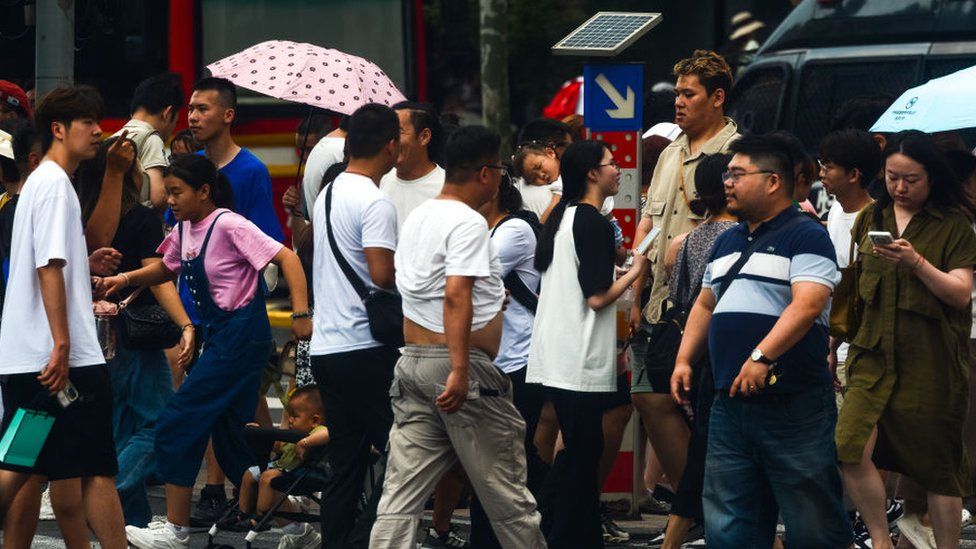
Over the last 10 to 15 years, as China’s economy quickly advanced, pressure on individuals have increased.
Chinese people have been burnt out as competitions at school and in the workplace have become more fierce, and mental health issues have gained attention from society, said Dr Miao from Shanghai New York University.
“As more people found themselves suffering from these issues, they became more willing to share their experiences with their family and friends, and seek professional help, and that changed the attitude towards this topic,” she added.
Numbers show that China’s depressed population has risen sharply. According to China Mental Health Survey which was released in 2019, one in every seven Chinese residents would suffer from at least one type of mental illness in their lifetime.
Even people who are widely seen as successful began to share their experiences.
In an article published in 2015, Ren Zhengfei, founder of tech giant Huawei, revealed he had once suffered from severe depression and anxiety. Zhang Chaoyang, founder of tech company Sohu, has addressed his past experience of depression several times openly.
The pandemic and China’s extremely strict “zero-Covid” policy have also taken a toll on people.
“Mental health issues occurred during the pandemic. [Trouble with] people’s income, trouble to find a job – people’s anxiety has always been there, and is even increasing,” Dr Miao said.
Earlier this year, the death of four young people by suicide at a famous tourist attraction in Hunan province sparked fierce discussion about mental health and social pressure in China.
The Chinese government has been trying to tackle this.
Dr Miao explained schools and universities are now required to have mental health consultants, and in big cities community units have designated people to look after elderly people’s mental health.
But one of the most pressing matters is that there are not enough qualified professionals. There were only 64,000 psychiatrists in China by the end of 2021, according to state media China Youth Daily.
“Compare to the fast pace of social awareness, the country has a long way to go on diagnose and treatment in terms of mental health illnesses,” added Dr Miao.
For information and support about any issues raised in this story contact the BBC Action Line
-
-
14 June 2021
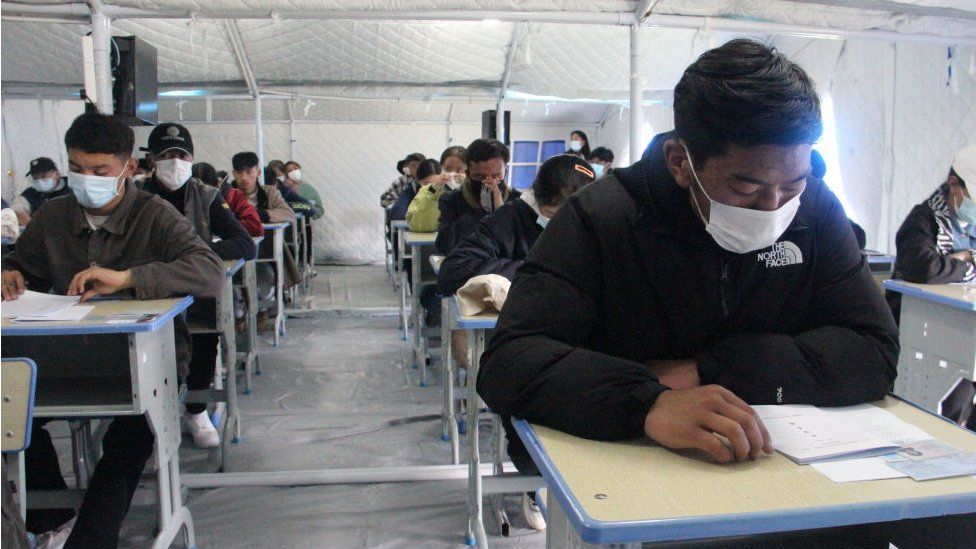
-
-
-
15 hours ago

-
Chip war may thwart Shanghai plans to build AI hub
The Shanghai government is stepping up its efforts to attract artificial intelligence (AI) talent and investments and improve regulations with the objective of building a world-class AI hub in Pudong.
Top Shanghai officials said in the World AI Conference on Thursday that the largest commercial city in China – which hosts the conference – will gather and groom AI experts to strengthen research and development and promote the use of AI technologies in the advanced manufacturing, urban management and robotics sectors.
However, Shanghai may face a hardware problem starting later this month, as the Biden administration is set to ban exports of Nvidia’s A800 and H800 AI chips to China soon and also restrict US investment funds from putting money into China’s high-technology sector.
In recent years, China’s Huawei Technologies and Cambricon Technologies have launched their AI chips, which are said to run at speeds of 60-to-70% that of Nvidia’s A100 chip. But the manufacturing of these chips is now done by Taiwan’s TSMC and can be affected by the prospective US curbs.
Supportive measures
On May 25, the Shanghai government in a document called upon private capital to invest in new infrastructure. It said it will extend the implementation period of its policy to provide an interest subsidy of up to 1.5 percentage points to private firms that build AI facilities.
It said integrated circuit, biomedical and AI sectors are the three most important industries that will build the “Shanghai high ground.”
Currently, Chinese AI firms can still buy A800 and H800 chips, which were introduced by Nvidia last November after the company’s A100 and H100 chips were added to a US export control list last August. It is said that A800’s performance has reached 70% of the A100’s.
Media reports said last week that the US Commerce Department may also ban the exports of A800 and H800 chips to China soon. The announcement reportedly would be made after US Treasury Secretary Janet Yellen’s four-day Beijing trip ends on July 9.
Ken Hu, rotating chairman of Huawei, said on Thursday that the company has been working hard developing AI chips and industrial applications in recent years.
Hu said both Huawei’s Ascend AI chips and Kunpeng central processing units (CPUs) have already made some key breakthroughs.
According to a research report published by CITIC Securities on Tuesday, more than 20 Chinese cities have used Ascend chips in their AI facilities while Huawei now has a 79% share in China’s AI computing center market.
Some media reports said Ascend 910’s performance is about 70% of that of the A100 while Cambricon’s Siyuan 370’s performance is about 60-70% of the A100. Both chips are manufactured in Taiwan using TSMC’s advanced 7nm technology.

Made in Taiwan
In May 2019, the US Commerce Department put Huawei and its 70 affiliates on its so-called entity list, on national security grounds. Huawei then started using inventory chips plus self-developed Kirin chips to maintain its smartphone output.
In September 2020, Taiwan’s TSMC stopped producing Kirin chips. In the third quarter of last year, Huawei ran out of its high-end processors and could no longer produce 5G-capable phones.
A Hainan-based columnist published an article last month with the title “Huawei’s Ascend 910 chip is leading in AI computing. Why is it not affected by the US sanctions?”
“Why can TSMC still make Ascend 910 chips but not Kirin 5G ones for Huawei? It’s because they used different technologies,” he says in the article.
He says Ascend 910 used Huawei’s self-developed Da Vinci architecture while Kirin chips used the United Kingdom’s ARM architecture, as well as technologies of the United States’ Cadence and Synopsys.
He adds that TSMC is a Taiwanese foundry, not an American firm, so it enjoys some space to maintain a business relationship with Huawei.
But a Fujian-based writer says that, even if TSMC can continue to produce AI chips for China, Chinese firms lack the tools to develop more advanced AI chips amid the US curbs and will be left behind by Nvidia.
In May, Nvidia said it will hire 1,000 people and invest up to TWD24.3 billion (US$790 million) in its new AI research center, or AI University, in Taiwan.
World AI Conference
The WAIC has been held in Shanghai annually since 2018. This year’s event attracted a lot more attention as the AI sector has become popular after the Microsoft-backed OpenAI unveiled ChatGPT 3.5, an AI chatbot, last November. Share prices of Nvidia, which has a more than 80% share in the AI chip markets, have grown 196% so far this year.
“There is a tremendous number of very smart and talented people in China,” Tesla founder Elon Musk said in a video shown during the WAIC. “The Chinese can be great at anything if they set their minds to, not only in many sectors of the economy but also in AI. I believe that China will have strong AI capabilities.”
“We will create a good atmosphere for gathering AI talent from all over the world, and accelerate the training of a group of top-notch and urgently-needed talents,” Shanghai party secretary Chen Jining said in opening speech at the WAIC. “We will adhere to open collaboration, build a platform, encourage cooperation, and create an open-source and innovative ecology.”
“We will actively explore the application practice of general AI technologies in vertical fields such as advanced manufacturing and urban management, and accelerate the development of embodied AI and robotics industries,” Chen said. “The government will strengthen safety supervision and continue to improve the AI governance and application standards.”
Shanghai Mayor Gong Zheng said Shanghai must firmly grasp the wave of new technological revolutions such as AI to upgrade its industries and turn itself into a socialist modern international metropolis with world influence. Gong said the city aims to build a high ground for itself in the AI industry.
Read: Sanctions starting to bite Huawei 4G chips sourcing
Read: Nvidia to turn Taiwan into a world-class AI hub
Follow Jeff Pao on Twitter at @jeffpao3
Netherlands to return treasures to Indonesia and Sri Lanka
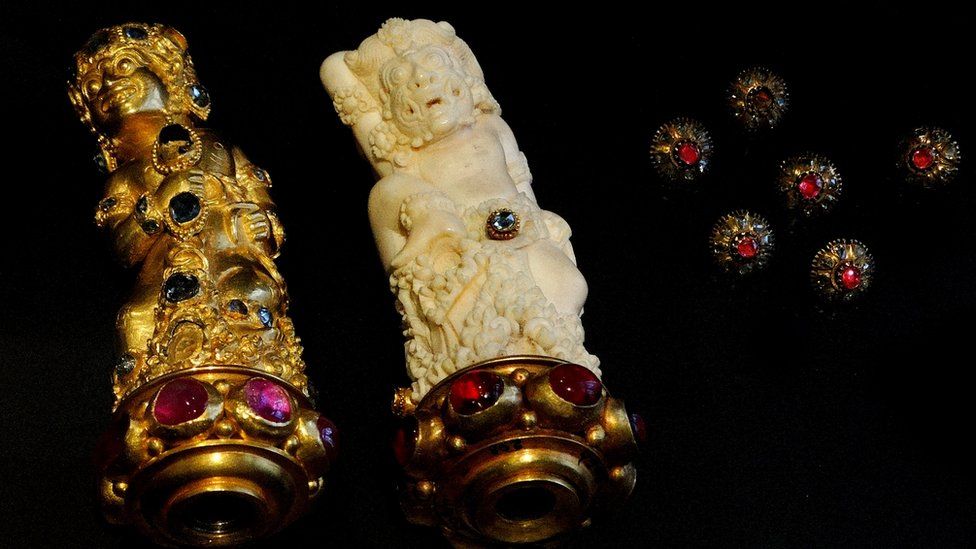 Getty Images
Getty ImagesThe Netherlands is set to hand back hundreds of precious artefacts taken from Indonesia and Sri Lanka during its colonial period.
Objects to be returned include a gem-encrusted bronze cannon and a looted cache of jewels from the “Lombok treasure”.
A report had urged the government to return items if countries request them.
The agreed restitution comes as the Netherlands increasingly confronts its colonial past.
Other countries have also began returning precious looted artefacts in recent years . Notable examples include British and German museums signing over some of the so-called Benin Bronzes stolen from Nigeria during a large-scale 1897 British military expedition.
“[This is] the first time that we are returning objects that should never have been in the Netherlands,” Culture Minister Gunay Uslu said.
“But we are not just returning objects. We are actually starting a period in which we are more intensively cooperating with Indonesia and Sri Lanka.”
Among the collections to be handed back to Indonesia is the so called “Lombok treasure” – a trove of jewels, precious stones, gold and silver which was looted by the Dutch colonial army from a royal palace on Indonesia’s Lombok island in 1894.
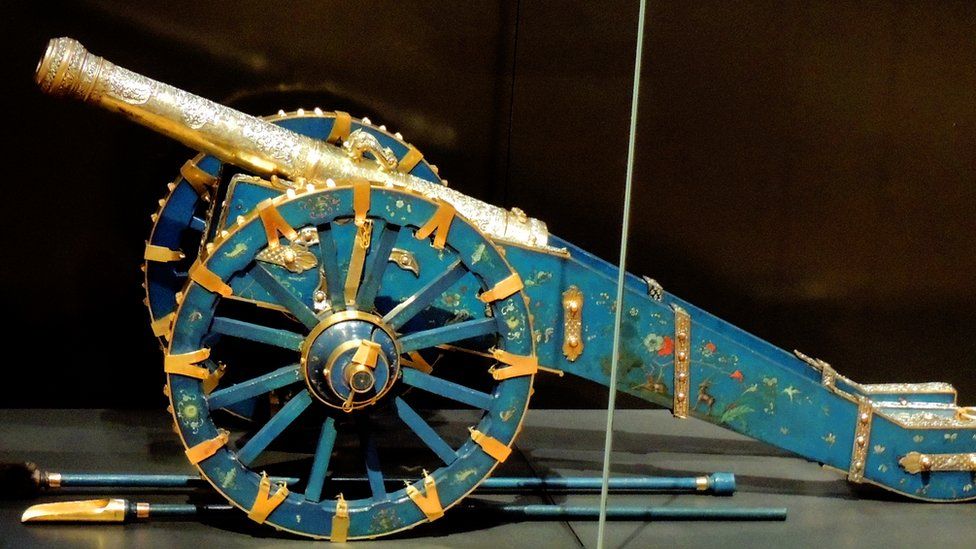
Sri Lanka will take back a lavishly decorated 18th Century bronze cannon, currently on display at Amsterdam’s Rijksmuseum, thought to have been a gift from a Sri Lankan aristocrat to the King of Kandy in the 1740s.
The cannon is believed to have fallen into Dutch hands in 1765, when Dutch troops attacked and conquered the Sri Lankan kingdom of Kandy.
Culture Minister Uslu said the government was acting on recommendations laid out in a 2020 report by a Dutch committee investigating art taken during the colonial era.
The committee urged the government to be “willing to return unconditionally” any cultural objects looted in former Dutch colonies if requested by the source country.
“The Netherlands must assume responsibility for its colonial past by making the recognition and redress of this injustice a key principle of the policy on colonial collections,” the report said.
The country has been wrestling with its legacy more openly in recent years.
On Saturday, King Willem-Alexander formally apologised for the Netherlands’ role in the slave trade, saying he felt “personally and intensely” affected.
The country became a major colonial power after the 17th Century, holding territories across the globe, and Dutch slave traders trafficked more than 600,000 people.
Related Topics
-
-
19 December 2022
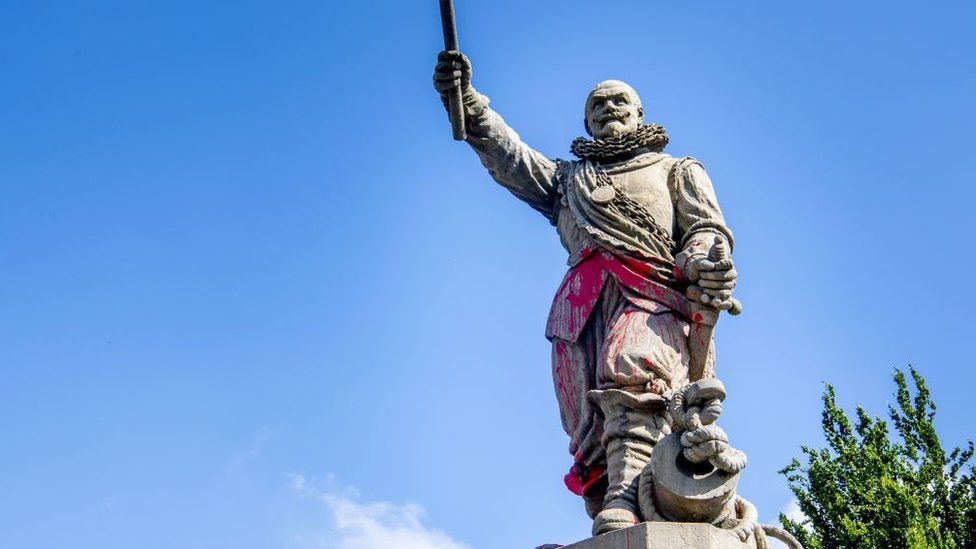
-




